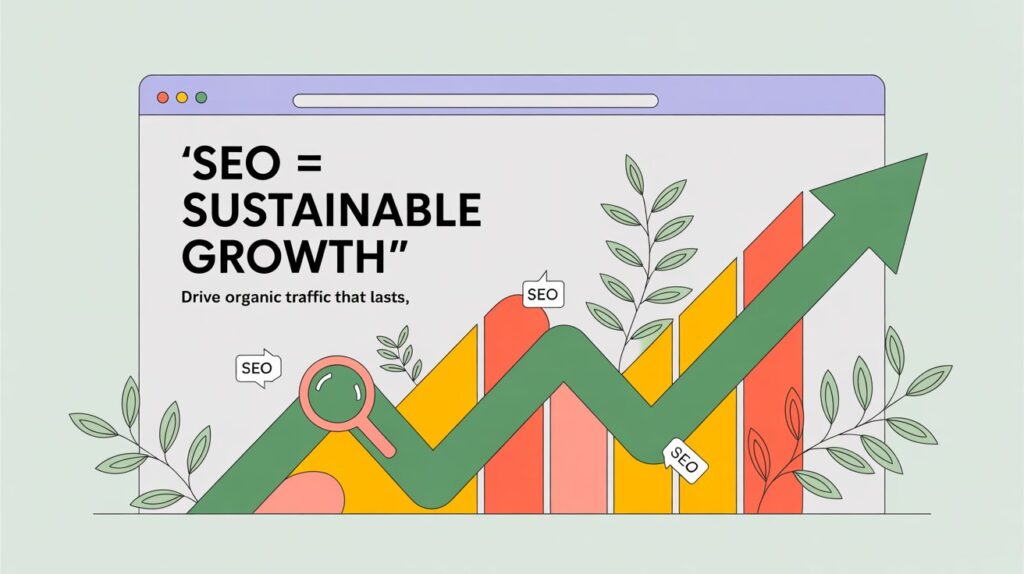Introduction to SEO and Its Significance
Search Engine Optimization (SEO) is crucial for improving businesses’ online presence in the digital era. Through strategic SEO, companies can significantly increase their organic traffic, translating into greater customer engagement and higher conversion rates. The value of SEO is underscored by numerous successful case studies, such as those featured on https://victorious.com/case-studies/, highlighting tangible improvements in visibility and user interaction. These studies illustrate how targeted SEO practices lead to measurable website performance and brand recognition growth.
SEO goes beyond merely boosting traffic; it focuses on attracting visitors genuinely interested in the products or services provided. Companies can customize their approaches to connect with and engage their audience by understanding search behaviors and trends. The swiftly evolving terrain of search engine algorithms demands that businesses adopt effective SEO strategies and consistently improve and modify them to maintain their competitive advantage.
Components of an Effective SEO Strategy
- Keyword Research: Keyword research forms the foundation of a successful SEO strategy. Businesses can create content that meets their needs and preferences by understanding potential customers’ language and phrases while looking for products or services. Tools like Google Keyword Planner provide invaluable insights into which keywords are most relevant and beneficial, helping companies decide which terms to target. This research influences content creation and informs paid advertising strategies and product development decisions.
- On-Page SEO: On-page SEO involves improving every web page’s visibility and usability for users and search engines. This entails creating top-notch content that seamlessly integrates pertinent keywords in a meaningful way, along with technical components such as meta tags, headings, and alt text for images. Making the site easy to navigate and logically organizing its content enhances the user experience and benefits search engine rankings. Moreover, consistently applying formatting and incorporating internal linking can significantly improve on-page SEO effectiveness by aiding search engines in comprehending the hierarchy and connections between various pages and sections of a website.
- Off-Page SEO: Off-page SEO involves activities beyond your website to influence rankings in search engine results pages. This primarily consists of building a high-quality backlink profile, which increases a site’s authority and trustworthiness. Engaging with communities via social media, contributing to forums, and pursuing guest blogging opportunities are critical components of a sound off-page SEO strategy. These activities bolster a site’s reputation, drive referral traffic, and enhance brand awareness. Building and nurturing relationships with influencers and authoritative bloggers in your industry can amplify your reach and influence.
The Impact of Quality Content on SEO
Content reigns supreme in SEO, and producing top-notch, pertinent material is essential for drawing in and keeping an audience. Engaging content that resonates with the audience is more likely to be shared, linked to, and referenced by other reputable sites, strengthening your site’s authority and visibility. As highlighted in the Search Engine Journal, high-quality content plays a pivotal role in SEO success by aligning with user intent and satisfying search engine algorithms. Producing compelling and informative content meets user needs, resulting in more extended site visits and reduced bounce rates. These factors are vital for improving SEO results, highlighting the importance of ongoing content efforts.
Technical SEO and Website Performance
Technical SEO encompasses enhancing a website’s infrastructure to boost its visibility on search engines. This includes mobile responsiveness, site speed, and enabling secure connections through HTTPS. Optimizing these areas ensures that search engines can effectively crawl and index your site. For example, a sluggish or unresponsive website may discourage potential customers from staying, resulting in increased bounce rates and diminished SERP rankings. Providing a smooth user experience on desktop and mobile devices is essential, given that more users are reaching websites through mobile devices now than ever before.
The Role of SEO in E-commerce
SEO can dramatically affect the success of e-commerce sites by amplifying their visibility in search engines. Online retailers can attract a more targeted audience by optimizing product listings, descriptions, and images for target keywords. According to a Forbes article on e-commerce SEO tips, key strategies like leveraging structured data, ensuring mobile-friendliness, and crafting unique product content are essential for boosting rankings and driving sales. SEO best practices in e-commerce involve optimizing product pages, utilizing structured data to enhance listings in search results, and creating unique content for product descriptions to avoid duplication. These techniques help e-commerce businesses to stand out in a crowded digital marketplace by reaching the right customers at the right time with the right message.
Adapting SEO Strategies for Changing Algorithms
Search engine algorithms continually evolve to enhance user experience by delivering the most relevant results. Companies need to monitor these changes and modify their SEO strategies accordingly.
Failing to adjust to algorithmic updates can significantly drop rankings and visibility. Regularly updating existing content, improving page speed, and maintaining high standards of quality and relevance are essential practices.
Measuring SEO Success
Assessing the effectiveness of SEO strategies is crucial for understanding their impact and identifying areas for improvement. Key performance indicators (KPIs) like organic traffic, bounce rates, and average session duration provide detailed insights into user interactions and behaviors. Tools such as Google Analytics offer comprehensive tracking and reporting features highlighting where traffic comes from and how visitors engage with a site. Regular evaluation of these metrics allows businesses to tweak their strategies to ensure continued growth and success in organic search.
The Future of SEO in Driving Sustainable Traffic
As the digital landscape evolves, SEO remains pivotal in driving sustainable traffic. It is essential to align SEO practices with users’ needs and interests while maintaining a site’s technical integrity. Future SEO achievement depends on a balanced strategy that emphasizes user-centric content, integrates technological innovations, and consistently adjusts to shifts in search engine algorithms. In doing this, companies can guarantee sustained growth in organic traffic, maintaining their advantage in a constantly evolving online landscape.

